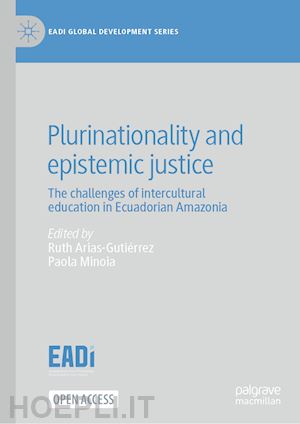
Questo prodotto usufruisce delle SPEDIZIONI GRATIS
selezionando l'opzione Corriere Veloce in fase di ordine.
Pagabile anche con Carta della cultura giovani e del merito, 18App Bonus Cultura e Carta del Docente
This book examines interculturality in education in Ecuador at the crossroads between an educational model inherited from the colonial past, which still represents white and mestizo hegemony, and a vision of an alternative form of decolonizing education that contributes to the development of an intercultural and plurinational state, as promised in the Ecuadorian Constitution. Championing indigenous voices and discussing the role of education in the fight against poverty and in the recovery of cultural and ecological diversity, the authors propose that quality education for all, a target of the Sustainable Development Goals, should move out of the commonly defined models of technological modernization and cultural globalization that disvalue knowledge from other cultures. Through their analysis of practical experimentations of indigenous and intercultural education in Amazonian schools and universities, they conclude that enhanced preservation of indigenous languages, cultures and ecological knowledge prove fundamental prerequisites for biological conservation and strengthening societies’ resilience to climate change threats.
Chapter 1: introduction: Education as cultural and ecological revitalization among Amazonian nationalities.- Chapter 2 - Public education policies and the struggle of the Indigenous movement for a decolonial interculturality.- Chapter 3 - Characteristics of the inclusion of Indigenous peoples in the school system.- Chapter 4 - From discourse to structure: interculturality in Amazonian universities.- Chapter 5 - Intercultural education and agency of Indigenous communities: a view from the Sapara territory.- Chapter 6 - Indigenous young people’s access to schools in the province of Pastaza.- Chapter 7 - Educational experiential calendars: creating links between Indigenous communities and high school.- Chapter 8 - Interculturality in the classroom: accompanying students from minority cultures in Pastaza.- Chapter 9 - Participatory Design interventions: supporting university student care networks in times of Covid.
Ruth Arias-Gutiérrez (Ecuador) is an Andean-Amazonian worker for biodiversity, equity and the exercise of rights and responsibilities. She is a full professor at the Amazon State University in Puyo, Ecuador where she has been serving as The Rector from 2019-2021. She was a PI in the project Ecocultural Pluralism in the Ecuadorian Amazon funded by the Academy of Finland. She has been a member of the environmental management network of the Ecuadorian Amazon with indigenous knowledge and is part of the European Action COST Decolonizing Development.
Paola Minoia (Italia) is an associate professor of geography at the University of Turin and an adjunct professor of global development studies at the University of Helsinki. Her research focuses on political ecology, socio-environmental justice, eco-cultural knowledges and territorialities. She was the Principal Investigator in the project Ecocultural Pluralism in the Ecuadorian Amazon funded by the Academy of Finland, a co-leader in the COST network Decolonising Development, and a member of the Executive Committee of EADI.











Il sito utilizza cookie ed altri strumenti di tracciamento che raccolgono informazioni dal dispositivo dell’utente. Oltre ai cookie tecnici ed analitici aggregati, strettamente necessari per il funzionamento di questo sito web, previo consenso dell’utente possono essere installati cookie di profilazione e marketing e cookie dei social media. Cliccando su “Accetto tutti i cookie” saranno attivate tutte le categorie di cookie. Per accettare solo deterninate categorie di cookie, cliccare invece su “Impostazioni cookie”. Chiudendo il banner o continuando a navigare saranno installati solo cookie tecnici. Per maggiori dettagli, consultare la Cookie Policy.